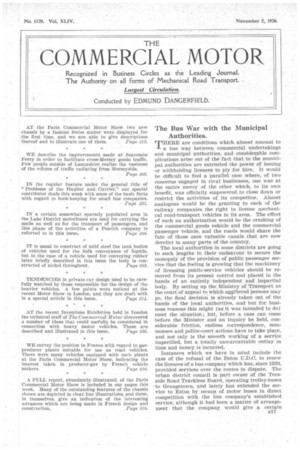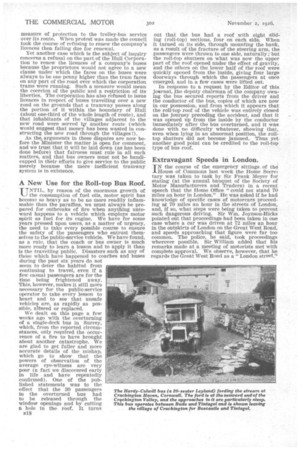The Bus War with the Municipal Authorities.
Page 43

Page 44

If you've noticed an error in this article please click here to report it so we can fix it.
THERE are conditions which almost amount to a bus war between commercial undertakings and municipal authorities, and considerable complications arise out of the fact that to the municipal authorities are entrusted the power of issuing or withholding licences to ply for hire. It would be difficult to find a parallel case where, of two concerns engaged in rival businesses, one was at the entire mercy of the other which, to its own benefit, was officially empowered to close down or restrict the activities of its competitor. Almost analogous would be the granting to each of the railway companies the right to license mechanical road-transport vehicles in its area. The effect of such an authorization would be the crushing of the commercial goods vehicle and the commercial passenger vehicle, and the roads would share the fate of those once valuable canals that are now derelict in many parts of the country.
The local authorities in some districts are going to such lengths in their endeavour to secure the monopoly of the provision of public passenger service that the feeling is growing that the machinery of licensing public-service vehicles should be removed from its present control and placed in the hands of an entirely independent and impartial body. By setting up the Ministry of Transport as the court of appeal to which ageleved persons may go, the final decision is already taken out of the hands of the local authorities, and but for business reasons this might (as it was intended to do) meet the situation ; but, before a case can come before the Minister and an inquiry be held, considerable friction, endless correspondence, summonses and police-court actions have to take place, and not only is the smooth working of a service imperilled, but a totally unwarrantable outlay in time and money is incurred.
Instances which we have in mind include the ease of the refusal of the Eston U.D.C. to renew the licences of a bus company which has, since 1920, provided services over the routes in dispute. The urban district council is part owner of the Teesside Road Trackless Board, Operating trolley-buses to Grangetown, and lately has extended the service to Eston by means of motor buses in direct competition with the bus company's established service, although it had been a matter of arrangement that the company would give a certain measure of protection to the trolley-bus service over its route. When protest was made the council took the course of refusing to renew the company's licences then falling due for renewal.
Yet another case which is the subject of inquiry concerns a refusal on the part of the Hull Corporation to renew the licences of a company's buses because the proprietors would not agree to a new clause under which the fares on the buses were always to be one penny higher than the tram fares on any part of the road over which the corporation trams were running. Such a measure would mean the coercion of the public and a restriction of its liberties. The corporation has also refused to issue licences in respect of buses travelling over a new road on the grounds that a tramway passes along the portion of it within the boundary of Hull • (about one-third of the whole length of route), and that inhabitants of the villages adjacent to the new road were served ly another route (which would suggest that money has been wasted in constructing the new road through the villages!).
As the arguments In these disputes are now before the Minister the matter is open for comment, and we trust that it will be laid down (as has been done before) that fairness must rule in all such matters, and that bus owners must not be handicapped in their efforts to give service to the public merely because the more inefficient tramway system is in existence.
A New Use for the Roll-top Bus Roof.
T TNTIL, by reason of the enormous growth of 'J the consumption of fuel oils, motor spirit has become so heavy as to be no more readily inflammable than the paraffins, we must always be prepared for outbreaks of fire when anything untoward happens to a vehicle which employs motor spirit as fuel for its engine, We have for some years pressed upon users, as a matter of urgency, the need to take every possible course to ensure the safety of the passengers who entrust them selves to the public-service vehicle. We have found, as a rule, that the coach or bus owner is much more ready to learn a lesson and to apply it than is the travelling public. Disasters such as any of those which have happened to coaches and buses during the past six years do not seem to deter the habitue from continuing to travel, even if a few casual passengers are for the time being frightened away. This, however, makes it still more necessary for the public-service operator to take every lesson to heart and to see that unsafe vehicles are, as rapidly as possible, altered or replaced.
We dealt on this page a few weeks ago with the overturning of a single-deck bus in Surrey, which, from the reported circumstances, only required the occurrence of a fire to have brought about another catastrophe, We are glad to get fuller and more accurate details of the mishap, which go to show that the powers of observation of the average eye-witness are very poor (a fact we discovered early in life and have repeatedly confirmed). One of the published statements was to the effect that the 80 passengers in the overturned bus had to be released through the window openings and by cutting a hole in the roof. It turns B18 out that the bus had a roof with eight sliding (roll-top) sections, four on each side. When It turned on its side, through mounting the bank, as a result of the fracture of the steering arm, the passengers were thrown to one side, naturally ;'but the roll-top shutters on what was now the upper part of the roof opened under the effect of gravity, and the others on the lower half of the roof were quickly opened from the inside, giving four large doorways through which the passengers at once emerged; and in a few eases were lifted out.
In response to a request by the Editor of this journal, the deputy chairman of the company owning the bus secured reports from the driver and the conductor of the bus, copies of which are now in our possession, and from which it appears that the roll-top roof of the vehicle was entirely closed on the journey preceding the accident, and that it was opened up from the inside by the conductor immediately after the bus overturned, and it was done with no difficulty whatever, showing that, even when lying in an abnormal position, the rolltop shutters did not become jammed. Thus yet another good point can be credited to the roll-top type of bus roof.
Extravagant Speeds in London.
TN the course of the emergency sittings of the _LHouse of Commons last week the Home Secretary was taken to task by Sir Frank Meyer for stating (at the annual banquet of the Society of Motor Manufacturers and Traders) in a recent speech that the Home Office "could not stand 70 miles an hour in London." He was asked if he had knowledge of specific cases of motorcars proceeding at 70 miles an hour in the streets of London, and, if so, what steps were being taken to prevent such dangerous driving. Sir Win. Joynson-Hicks pointed out that proceedings had been taken in one case where a car was driven at 72 miles an hour In the outskirts of London on the Great West Road, and speeds approaching that figure were far too common, The police, he said, took proceedings wherever possible. Sir William added that his remarks made at a meeting of motorists met with complete approval. We observe, however, that he regards the Great West Road as a "London street."




























































































































